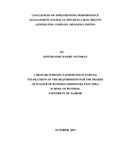| dc.description.abstract | An Employees’ Performance Management System has become a business imperative
in today’s competitive business arena, where organizations are constantly working to
improve their performance and profitability. The purpose of this study was to
investigate the challenges of implementing performance management systems at
KenGen. The research design was a case study. Data was collected using an in-depth
interview guide. The collected data was analyzed using content analysis method. The
respondents were from top and middle level management staff namely managers and
Chief Officers. The study findings reviewed that, there were various PMS
implementation challenges in all components of PMS at KenGen. The main
challenges included; lack of clear link between annual corporate planning cycle and
performance planning cycle, setting of weak performance measures, complexity of the
evaluation tool , under-utilization of performance monitoring tools like tracking
sheets and performance boards, inadequate performance feedback mechanisms,
difficulties in implementing PDP’s, lengthy approval for bonus payment, inactive
participation of line managers , the existing culture which is not enabling, existing
matrix structure which led to double reporting, lack of union involvement and long
turnaround times in performance management activities. From the above findings, it
can be concluded that implementation of PMS in KenGen faced varied challenges in
all the five components. It was very difficult to manage the existing bi annual
evaluation system as it made it difficult to achieve turnaround times in other
performance activities in prevailing organizational culture and attitudes amongst staff.
The researcher recommends that annual planning and budgets should be synchronized
with performance management cycle. Corporate goals should be translated to
individual goals when planning performance. Evaluation tool should be specific to
certain categories of staff. Feedback and rewards should be timely while high
performance and enabling culture should established to support the implementation of
PMS. Future research could investigate the extent to which these findings can be
generalized to other public sectors in central and county governments. A cross
sectional study across a number of institutions within the sector can also be done to
make comparative analysis. | en |

